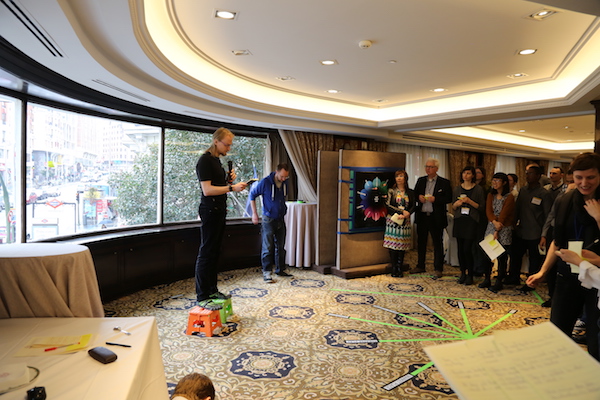The Future of Scholarly Commons
Last week I went down to Madrid, to participate in a workshop of FORCE11 on Defining the Scholarly Commons. The event brought together around 50 people, representing sciences, humanities and libraries and coming from very different parts of the world and career-stages (see a breakdown of the backgrounds of the participants here). Which in itself already makes a great opportunity for broadening your horizon, but the very interactive nature of the workshop made it even better. The setting for workshop was a broad gedankenexperiment: Imagine Academia as we know it has just vanished from the face of the earth, for unknown reasons (and who doesn’t like to entertain the possiblity from time to time, when writing grants or papers?). How would we re-build Academia (if at all) and what would happen to the commons?
In order to get started, everyone was asked to jot down some of the features that their re-build scholarly commons would include. Those ideas were then used to play a modified version of musical chairs: As long as the music kept playing everyone was roaming and dancing around the conference room. And as soon as it stops you start discussing your different ideas with the person next to you. A great way to break the ice and see where people have similar ideas to yours. After some rounds of this everyone got the chance to take the soapbox and present their favorite idea.

From those initial ideas and visions people found each other in changing groups and started to discuss their ideas for the next 1 1/2 days: Finding out where the commons should head and how to solve the looming problems of the newly found commons, always applying the Law of Two Feet, in order to maximize your own learning and contributions.
I happened to end up in a very nice group, discussing how commercial actors could use the commons, if at all. I think while we all agreed that they should be able to utilize the commons somehow, we all were somewhat worried that they might exploit or diminish the value of the commons, leading to one of our principles we set for our thinking: The commons need to be used in a way that its utility may not decrease.
For me this means that the commons aren’t a one-way street. Just as venture capitalists might fund your commercial enterprise for a start and expect to get some return in case you succeed, the commons as a public good give you some intellectual funding you can start to work on, bootstrapping your efforts. But if you create additional value from this, there should be some moral obligation to return parts of it, enriching the commons.
The Windower, co-created by the @theWinnower #FutureCommons pic.twitter.com/Erb9JMcbkG
— Bastian Greshake (@gedankenstuecke) February 27, 2016
During our discussions we encountered probably one of the oldest problems with the commons, how to define them and what makes actors commercial? Ultimately this lead to one of the biggest questions when dealing with the commons: Why does this make my head hurt?
Which is why we abandoned our initial question by applying the law of two feet, setting ourselves up for the more general questions, leading us to some general principles to keep in mind and look out for when analyzing the commons: The idea of I know it when I see it seems to work for the commons as well. What is part of it needs to be discussed and reevaluated over time, as there’s no single answer to this carved in stone. Additionally the commons can’t only be the intellectual content in it. The commoners who participate are just as importantly the commons, making it a dynamic and evolving eco-system.
In the end (and at various points in between) all the groups presented their ideas and visions, some even with some small theatrical presentations. It was great to see how many different, but also very similar ideas all the groups came up with over the course of the workshop. The complete documentation, including more pictures and more advanced visualizations can be found online as well.
I am personally pretty amazed by what we all accomplished in so little time. And I look forward to meet many of the great participants again in Portland, for FORCE2016.
Loving this pic of the #futurecommons #opencon alum! Thanks @RadicevSlobodan @open_con pic.twitter.com/jdnnIz8v8J
— Robin Champieux (@rchampieux) March 1, 2016
p.s. I’m not exactly sure how I got the idea while talking to The Winnower, but I registered the url thecommons.science. So if you have use for it let me know.
